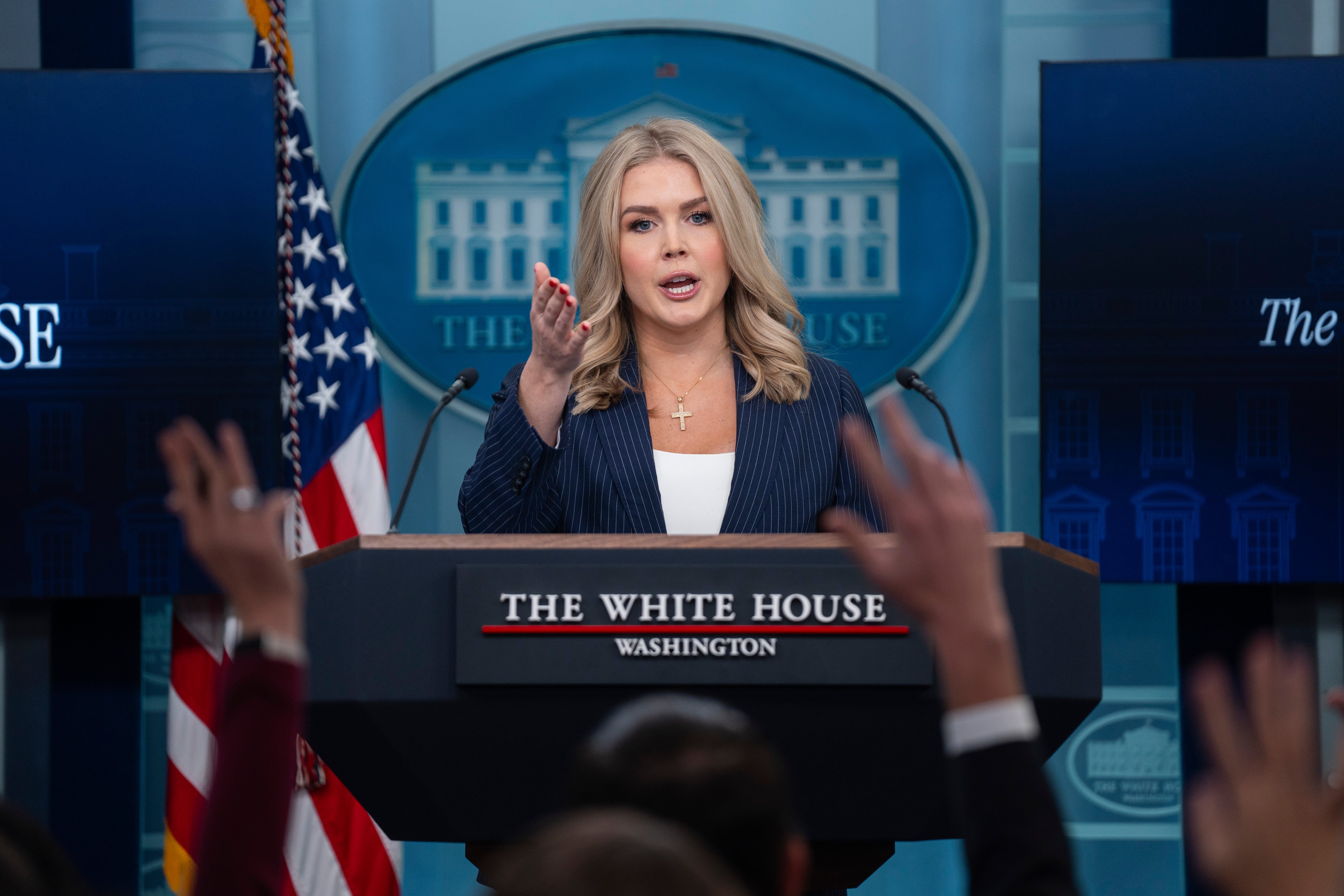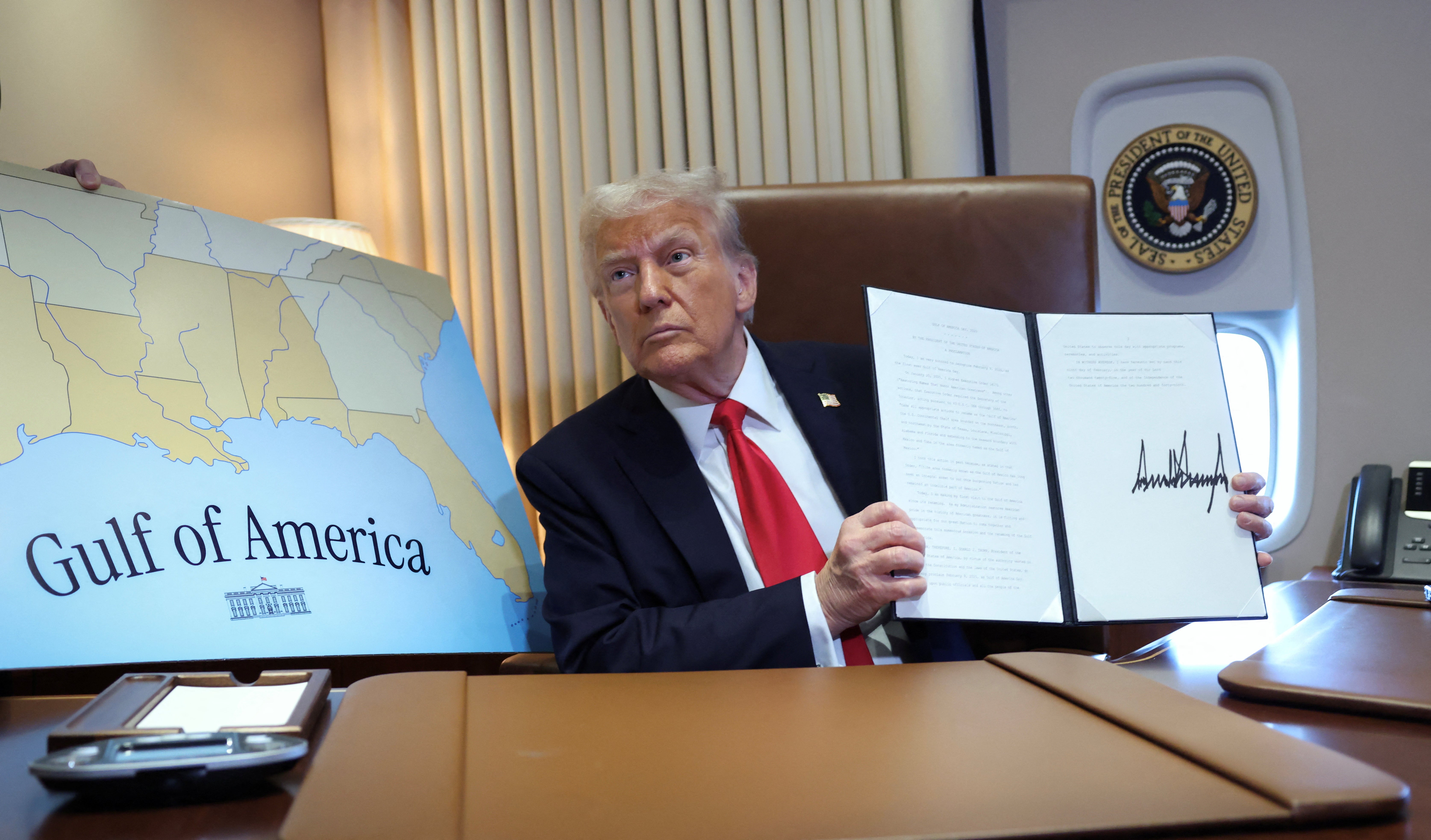White House press secretary Karoline Leavitt confirmed on Wednesday that Associated Press reporters were barred from covering Donald Trump’s White House events a day earlier because of the outlet’s editorial decision to refer to the Gulf of Mexico by its original name.
When asked if the White House’s actions were “retaliatory in nature” and how they aligned with a commitment to freedom of the press, Leavitt insisted that the administration was merely holding “lies accountable” by blocking access to the AP.
After one of its reporters was banned from attending Trump’s Oval Office press conference with Elon Musk on Tuesday afternoon, AP Executive Editor Julie Pace issued a statement revealing why the White House rejected the journalist.
“Today we were informed by the White House that if AP did not align its editorial standards with President Donald Trump’s executive order renaming the Gulf of Mexico as the Gulf of America, AP would be barred from accessing an event in the Oval Office,” Pace wrote. “This afternoon AP’s reporter was blocked from attending an executive order signing.”
She added: “It is alarming that the Trump administration would punish AP for its independent journalism. Limiting our access to the Oval Office based on the content of AP’s speech not only severely impedes the public’s access to independent news, it plainly violates the First Amendment.”

A second AP reporter was later barred from covering an evening event in the White House’s Diplomatic Reception Room. Meanwhile, as Trump and his administration ramp up their adversarial relationship with the media, press organizations have labeled the administration’s actions an affront to the First Amendment and urged the White House to reverse course. Following Wednesday’s press briefing, an AP reporter who was on White House pool reporting duty was blocked from attending the swearing-in ceremony of new Director of National Intelligence Tulsi Gabbard, which took place in the Oval Office.
“The White House cannot dictate how news organizations report the news, nor should it penalize working journalists because it is unhappy with their editors’ decision,” White House Correspondents’ Association president Eugene Daniels noted.
“Barring a journalist from an official event because their newsroom refuses to conform to government-imposed language is more than an attack on one reporter or outlet — it is an assault on the First Amendment and the public’s right to know,” National Press Club president Mike Balsamo said, adding that the administration’s decision was “a direct attack on press freedom.”
During a press briefing on Wednesday, Leavitt was asked by CNN anchor Kaitlan Collins what was behind the decision to bar the two AP reporters from the White House events on Tuesday.

“It is a privilege to cover this White House. It is a privilege to be the White House press secretary. And nobody has the right to go into the Oval Office and ask a president of the United States questions – that is an invitation that is given,” the press secretary responded.
“And there are hundreds of outlets on this campus, many of you in this room, who don’t have the privilege of being part of that pool every single day and getting to ask the president questions. We reserve the right to decide who gets to go into the Oval Office, and you all have credentials to be here – including the Associated Press, who is in this briefing room today.”
Collins followed up by wondering if this was “retaliatory in nature,” noting that the AP stated its reporters were barred because the publication decided to continue using the Gulf of Mexico, which aligns with the outlet’s standards despite Trump’s executive order. The AP Stylebook is also not just used by the agency but is relied upon by thousands of journalists and reporters worldwide.
“So the question here is – is this setting a precedent that this White House will retaliate against reporters who don’t use the language that you guys believe reporters should use, and how does that align with the First Amendment commitment you were just talking about?” Collins pressed the White House spokesperson.
"I was very upfront in my briefing on day one that if we feel that there are lies being pushed by outlets in this room, we are going to hold those lies accountable,” Leavitt responded. “And it is a fact that the body of water off the coast of Louisiana is called the Gulf of America, and I am not sure why news outlets don’t want to call it that, but that is what it is.”
Noting that the secretary of the interior has made “Gulf of America” the official designation, she added that both Apple and Google have recognized that, along with “pretty much every outlet in this room,” before taking a final swipe at the AP.
“And it is very important to this administration that we get that right, not just for people here at home but also for the rest of the world.",” she concluded.
“President Donald Trump has signed an executive order to rename the Gulf of Mexico to the Gulf of America. The body of water has shared borders between the U.S. and Mexico. Trump’s order only carries authority within the United States. Mexico, as well as other countries and international bodies, do not have to recognize the name change,” the AP announced last month after Trump’s executive order.
“The Gulf of Mexico has carried that name for more than 400 years,” the outlet added. “The Associated Press will refer to it by its original name while acknowledging the new name Trump has chosen. As a global news agency that disseminates news around the world, the AP must ensure that place names and geography are easily recognizable to all audiences.”
The Associated Press did not immediately respond to a request for comment on Leavitt’s remarks on Wednesday.







